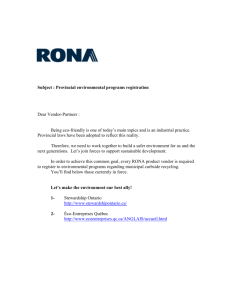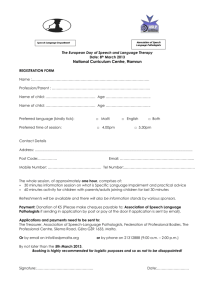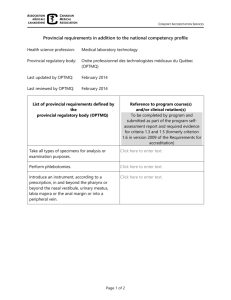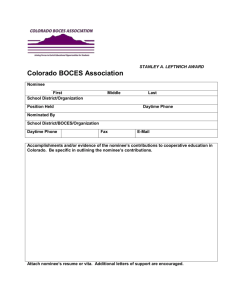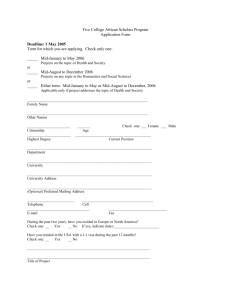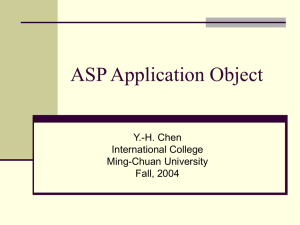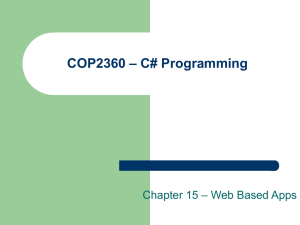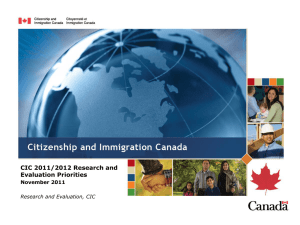Working in BC: A guide for internationally trained Speech
advertisement
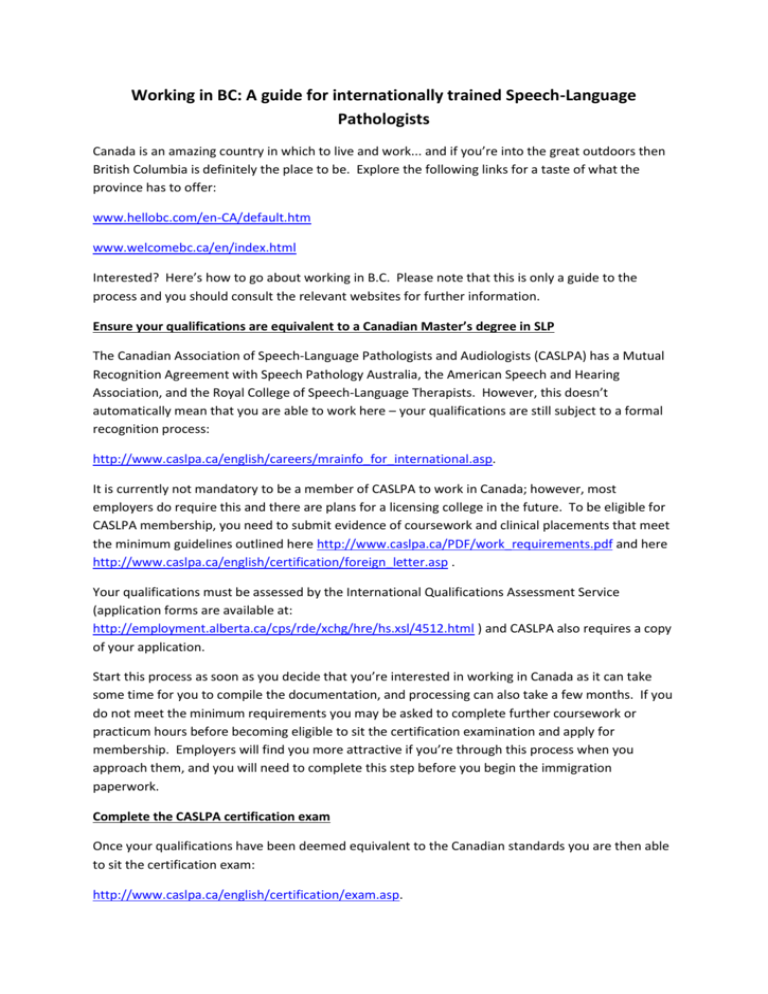
Working in BC: A guide for internationally trained Speech-Language Pathologists Canada is an amazing country in which to live and work... and if you’re into the great outdoors then British Columbia is definitely the place to be. Explore the following links for a taste of what the province has to offer: www.hellobc.com/en-CA/default.htm www.welcomebc.ca/en/index.html Interested? Here’s how to go about working in B.C. Please note that this is only a guide to the process and you should consult the relevant websites for further information. Ensure your qualifications are equivalent to a Canadian Master’s degree in SLP The Canadian Association of Speech-Language Pathologists and Audiologists (CASLPA) has a Mutual Recognition Agreement with Speech Pathology Australia, the American Speech and Hearing Association, and the Royal College of Speech-Language Therapists. However, this doesn’t automatically mean that you are able to work here – your qualifications are still subject to a formal recognition process: http://www.caslpa.ca/english/careers/mrainfo_for_international.asp. It is currently not mandatory to be a member of CASLPA to work in Canada; however, most employers do require this and there are plans for a licensing college in the future. To be eligible for CASLPA membership, you need to submit evidence of coursework and clinical placements that meet the minimum guidelines outlined here http://www.caslpa.ca/PDF/work_requirements.pdf and here http://www.caslpa.ca/english/certification/foreign_letter.asp . Your qualifications must be assessed by the International Qualifications Assessment Service (application forms are available at: http://employment.alberta.ca/cps/rde/xchg/hre/hs.xsl/4512.html ) and CASLPA also requires a copy of your application. Start this process as soon as you decide that you’re interested in working in Canada as it can take some time for you to compile the documentation, and processing can also take a few months. If you do not meet the minimum requirements you may be asked to complete further coursework or practicum hours before becoming eligible to sit the certification examination and apply for membership. Employers will find you more attractive if you’re through this process when you approach them, and you will need to complete this step before you begin the immigration paperwork. Complete the CASLPA certification exam Once your qualifications have been deemed equivalent to the Canadian standards you are then able to sit the certification exam: http://www.caslpa.ca/english/certification/exam.asp. Exams are held in the northern hemisphere spring and fall each year in various locations across Canada. It is possible to sit the exam outside of Canada but you must contact CASLPA regarding this (see http://www.caslpa.ca/english/certification/certif5.asp ). Note that there are registration deadlines. Study tips are available through the CASLPA website (http://www.caslpa.ca/english/certification/exam_preparation.asp ) Find Employment In most circumstances you will be required to arrange employment before arriving in Canada, and will need a letter confirming the job offer from your employer. There is a need for Speech-Language Pathologists to work in paediatric settings in British Columbia, and current job opportunities can be accessed via the therapybc website: www.therapybc.ca There is also a Provincial Paediatric Therapy Consultant (PPTC) in BC that assists therapists and employers with recruitment and retention issues in paediatric settings. The PPTC ensures there are regional professional development opportunities, and also has funds available to support therapists choosing to attend continuing education events. Feel free to contact the PPTC at consultant@therapybc.ca for further information regarding initiatives to support therapists working in paediatrics. Complete the immigration requirements There is more than one way to enter Canada to work as a Speech-Language Pathologist, whether you intend to stay for a year or many more. The immigration process can be a little confusing but it is definitely worth it in the end. A Canadian immigration lawyer or representative may be able to help you and/or your employer navigate the process more easily; however, you should consult this website first: http://www.cic.gc.ca/english/information/representative/index.asp . Remember that the information that follows is a guide only and that you should contact the office of the Canadian Consulate General in your home country or region for further clarification. As a general rule, you need to complete your application before you come to Canada so that you enter the country with your work permit or landed immigrant status. Work permit - to work temporarily in Canada You will need a job offer and your employer is required to obtain a Labour Market Opinion from Human Resources and Social Development Canada to prove that they are allowed to hire a foreign worker to fill the position (this itself may take a couple of months to obtain). You can check the application processing times on the website. Typically, it takes 28 days or less once you send in the completed application, along with the labour market opinion, for a decision to come through. http://www.cic.gc.ca/english/work/index.asp. Work permits are usually valid for 12 months and are renewable at the discretion of Immigration Canada. If you come to Canada on a work permit, you can apply for permanent residency later if you qualify in one of the permanent residency categories: http://www.cic.gc.ca/english/work/extend-stay.asp. Skilled Worker – permanent residency If you apply under this category, you don’t necessarily need to have a job organised before you arrive (you will be a “landed immigrant”), but you do need to meet some strict eligibility requirements: http://www.cic.gc.ca/english/immigrate/skilled/index.asp There is a long waiting list to come to Canada and 80% of worldwide applications are processed within 5-6 years. You can fast-track the process by applying for permanent residence under the Provincial Nominee Program. You can also apply for residency as a skilled worker after arriving in Canada on a work permit, although it will still take some time to be processed. Provincial Nominee Program (PNP) - fast-track to residency To qualify as a provincial nominee, you do need to have a job offer and the province you wish to live in needs to nominate you for PNP status. You then complete a skilled worker application under that status. If approved you will be a permanent resident within months, rather than years: http://www.cic.gc.ca/english/immigrate/provincial/index.asp A Labour Market Opinion is not required for provincial nominees as they are in occupations listed as ‘strategic’ (that is, it has already been identified that there is a need to allow foreign workers to come into those positions). Each province has its own list of strategic occupations. More information on the Provincial Nominee Program can be found here: http://www.ecdev.gov.bc.ca/ProgramsAndServices/PNP/index.htm Unfortunately, Speech-Language Pathologists are not currently on the list of strategic occupations. With the help of an immigration lawyer or a dedicated employer, you may be able to have your case for PNP status successfully pleaded. Citizenship Once you have become a permanent resident, you can remain in Canada for as long as you wish. If you stay for 3 out of 4 years after obtaining residency, you then become eligible for citizenship (see http://www.cic.gc.ca/english/citizenship/index.asp ). Example of the timeline for an Australian-trained therapist who immigrated to Canada May 2006 - Started gathering the paperwork to support an application to CASLPA and IQAS August 2006 - Sent off applications September/October 2006 - received confirmation from CASLPA that my course was considered equivalent to a Canadian master’s degree, with some additional practicum hours November 2006 - completed an extra audiology practicum and registered for the next CASLPA Certification Exam March 2007 - completed the certification exam (outside of Canada) May 2007 - received results and joined CASLPA and BCASLPA August 2007 - started looking for work in Canada September 2007 - offered a job in Canada October 2007 - started the process of applying for provincial nominee status. This required a letter from my employer, and the help of an immigration lawyer Mid January 2008 - Received confirmation that I had been approved for provincial nominee status. The immigration lawyer sent off an application for a work permit to enter Canada on the basis of my being a provincial nominee End of January 2008 - Flew to Canada. My work permit application had been approved two days beforehand March 2008 - sent off application for permanent residency (as a provincial nominee) June 2008 - medical examination completed August 2008 - residency approved Setting yourself up for life in B.C Once you have successfully made the transition to working in a BC paediatric setting, here are some key things to sort out in your first few months: Social Insurance Number – This is for tax purposes and you will need to organise it when you first arrive. http://www.servicecanada.gc.ca/en/sc/sin/ Medical Service Plan – Allows access to the public medical system. You need to apply within 3 months of the first day of the month that you actually arrived. http://www.health.gov.bc.ca/insurance/bcresidents.html Drivers licence – Go to a ServiceBC office within 3 months of arriving and check the rules, these change depending on what country you are from. You may need to sit a theory test, or a theory and a practical test, to be eligible for a BC drivers licence. http://www.icbc.com/. Bring evidence of your car insurance and driving history record with you to Canada – this will give you a fairly dramatic saving on car insurance and is required before you sit any licensing tests.
